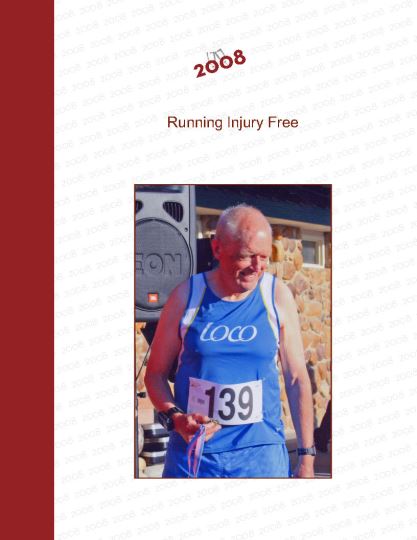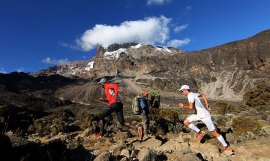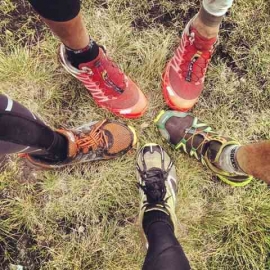Running Injury Free_Allen Leigh_2008 目录:
Contents
Home (Running Injury Free) 6
Coaching Running on the Internet 6
The Real Meaning of the 10% Rule 8
A Tribute to Dr. George Sheehan 9
The Basics of Jogging 10
Training Diaries for Running 15
Stretching for Runners 16
Pictures of Stretch Exercises 21
Running Training Plans 26
The Warm Up Phase of Running 28
Beginning Running 29
A Plan for Beginning Running 33
Intermediate Plan for Runners 35
Training to Run Your First Half or Full Marathon 37
Low Stress Training Plan for First Half-Marathon 40
Low Stress Training Plan for First Marathon 42
The Stress of a Marathon 46
The Effects of Marathons and Ultras on Our Bodies 49
Keeping Motivated to Run 53
Long Slow Distance 56
Speed Training for Runners 57
Running Hills 60
Running for distance or for time? 62
The Long and Medium Runs 63
Peaking in Running Performance 65
Training Paces while Running 66
A Paradox in Running Paces 69
Stride Rate and Length While Running 71
Negative Splits While Running 72
Foot Strike while Running 73
Tapering Before a Race 76
Lactate Threshold in Running 76
Using Strength Training to Avoid Injuries 77
Maximum Oxygen Intake (VO2max) 79
Run the Tangents 80
Weekly Distance 81
The Cool-Down Phase of Running 82
Monitoring Your Wakeup Heart Rate 83
Overtraining In Your Running 85
Running Form 87
Age Grading 91
Cross-Training 93
Total Body Strength 94
Weather and Running 100
Age and Running 105
Health to Allow Running 106
Handling Stress from Running 107
Losing Weight from Running 109
Take Care of Your Feet 112
Barefoot Running 113
Should You Run in Minimalist Shoes? 114
Injuries from Running 116
Preventing Injury while Running 117
Running Clothes 122
Running Shoes 123
Running Addiction 125
Running Jargon 126
Running Myths 130
Running Injury Free_Allen Leigh_2008 试读:
Allen's response to the runner:
Hi,
I'm not qualified to be your coach, but here are a few ideas from the running literature.
1. Run pain-free. Pain is a sign from your body that you're exceeding its capacity in some
way. I've been running for about 23 years, including four marathons when I was your age,
with no injuries, because I run pain-free. If I experience pain, I back off my training a bit
until the pain is gone and then give my body more time to get used to what I'm doing. By
doing this, I keep injuries away.
2. Follow the 10% rule. When you increase the stress on your body by increasing your
distance or speed (try to not increase both at the same time), keep your increases at 10%
or less and stay at each new level until you feel comfortable with it. I've found that my
body likes at least a week at each level, and sometimes longer.
3. When you complete a run, you should feel great and should want to keep going. If you
feel tired at the end of a run, you've gone too far or too fast. Back off until you feel great
when you finish each run.
4. While you are running, you should be able to carry on a conversation with a partner. If
you're huffing & puffing and can't talk, you're going too fast. Back it off.
5. If you get a raw throat or side stitches [cramps] while running, you're going too fast.
Back it off.
6. Run heavy/light. After you've run a "heavy" day, follow it with a "light" day of about half
the distance. It takes your body 48 hours to recover from the heavy day. If you run heavy
day after day, your body never fully recovers and gets into "stress-debt", then injuries
come after a few months.
7. Don't run more than five days per week. Give yourself some rest days. Your overall
performance will go up because you'll be more rested when you do run.
8. Throw in a light week each month. During the light week, you're still alternating
heavy/light days, but you reduce the distance/speed of the heavy days.
9. If you leave home for a run and after a mile or two you feel tired and not particularly
enthused about continuing the run, stop, pack it in, and go home. Your body is telling you
that you need some rest. If your body is doing great, you should feel great after the first
couple of miles of warming up. If your body is feeling tired, however, so will you.
10. Remember that it isn't the stress you apply to your body that builds strength; it is the
rest. You apply stress by running some distance at some speed. Then you give your
body rest. Your body reacts to the stress by becoming stronger. If you don't give your
body enough rest, then all you're doing is tearing your body down.
11. The more you run, the more important it is that you get enough sleep.
12. Measure your rest pulse each morning. The best time to do this is when you first
wake up, since that is the one time during the day when you body is at the same activity
更多跑步书籍见://www.nduoke.com//www.nduoke.com/running-books
更多跑步书籍下载见://www.nduoke.com//www.nduoke.com/shujixiazai
跑步书籍下载地址合集 见://www.nduoke.com//www.nduoke.com/shujixiazai/download
跑步书籍大全附下载 ://www.nduoke.com//www.nduoke.com/running-books/daquan
跑步书籍推荐合集 见://www.nduoke.com//www.nduoke.com/running-books/tuijian
跑步书籍精选书单附下载见: //www.nduoke.com//www.nduoke.com/running-books/jingxuan




